During its annual conference in New Orleans, the International Reading Association announced the 2014 winners of the IRA Children’s and Young Adult Book Awards. This prestigious award focuses on promising debut authors; only first and second books by an author are considered by the book awards committee. The winning 2014 authors certainly show early and “unusual promise in the children’s and young adults’ book field.” Check out these titles for exciting summer reads that would make great additions to your classroom next year! Thanks to the members of the IRA Children’s and Young Adult Book Awards Committee for this week’s reviews.
Primary Fiction Winner:
McAnulty, Stacy. (2013). Dear Santasaurus. Illustrated by Jef Kaminsky. Honesdale, PA: Boyds Mills Press.
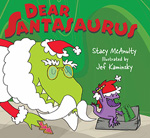 Ernest B. Spinosaurus desperately wants to stay on Santasaurus’ nice list all year in order to receive the Jurassic Turbo Scooter X9 with the working headlight, racing fin, and secret compartment that he has on his Christmas list. Alas, Ernest is full of energy, ideas, and mischief, which assist in creating situations that are challenge his good behavior. McAnulty’s use of humor through letter-writing makes this book an interesting and educational read for all children who eagerly anticipate Christmas morning.
Ernest B. Spinosaurus desperately wants to stay on Santasaurus’ nice list all year in order to receive the Jurassic Turbo Scooter X9 with the working headlight, racing fin, and secret compartment that he has on his Christmas list. Alas, Ernest is full of energy, ideas, and mischief, which assist in creating situations that are challenge his good behavior. McAnulty’s use of humor through letter-writing makes this book an interesting and educational read for all children who eagerly anticipate Christmas morning.
- Amy Ruddy, South Abington Elementary School, Clarks Summit, Pennsylvania
Primary Fiction Honor Books:
Grossinger, Tania. (2013). Jackie and me: A very special friendship. New York, NY: Skyhorse Publishing/Sky Pony Press.
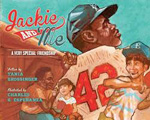 This historical fiction story describes the unlikely friendship between baseball legend Jackie Robinson and thirteen-year-old Tania Grossinger. Young Tania lives in the famous Grossinger Hotel in New York's Catskill Mountains. Many celebrities visit Grossinger's, but Tania really only wants to meet one man: Jackie Robinson. Their friendship first forms over a game of ping-pong, but their friendship and the life lessons Tania learns from Jackie last a lifetime. Readers learn about feeling different, building character, overcoming obstacles, and believing in oneself from this book, narrated by Tania. This engaging story of friendship will appeal to girls and boys, parents, baseball enthusiasts, and educators alike.
This historical fiction story describes the unlikely friendship between baseball legend Jackie Robinson and thirteen-year-old Tania Grossinger. Young Tania lives in the famous Grossinger Hotel in New York's Catskill Mountains. Many celebrities visit Grossinger's, but Tania really only wants to meet one man: Jackie Robinson. Their friendship first forms over a game of ping-pong, but their friendship and the life lessons Tania learns from Jackie last a lifetime. Readers learn about feeling different, building character, overcoming obstacles, and believing in oneself from this book, narrated by Tania. This engaging story of friendship will appeal to girls and boys, parents, baseball enthusiasts, and educators alike.
- Leslie Fisher, Hamilton Southeastern School District, Fishers, IN
Klausmeier, Jesse. (2013). Open this little book. Illus. by Suzy Lee. San Francisco, CA: Chronicle Books.
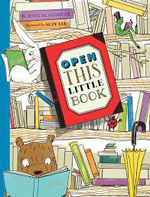 When readers open this book, they will find one surprise after another. Not only does the physical book grow smaller and smaller and then bigger and bigger, but the animals, colors, and objects in the illustrations connect in complex ways too. Watch that rabbit, for instance, and you will notice inter-textual references to the pocket watch in Alice in Wonderland. The bear in this story has an umbrella, just like Winnie the Pooh in Milne’s first book. This cumulative tale grows dramatically towards the middle of the book as readers enjoy a rainbow of collaboration, color, and the actual reading of the Little Rainbow Book, and then begins to enlarge toward the end of book where we find animals and humans alike happily reading. Expect the unexpected when you open this little book.
When readers open this book, they will find one surprise after another. Not only does the physical book grow smaller and smaller and then bigger and bigger, but the animals, colors, and objects in the illustrations connect in complex ways too. Watch that rabbit, for instance, and you will notice inter-textual references to the pocket watch in Alice in Wonderland. The bear in this story has an umbrella, just like Winnie the Pooh in Milne’s first book. This cumulative tale grows dramatically towards the middle of the book as readers enjoy a rainbow of collaboration, color, and the actual reading of the Little Rainbow Book, and then begins to enlarge toward the end of book where we find animals and humans alike happily reading. Expect the unexpected when you open this little book.
- Renita Schmidt, The University of Iowa
Koch, Miriam. (2013). Digby differs. Translated from German by Ann Garlid. White Plains, NY: Peter Pauper Press.
 Digby Differs is a different kind of book in that it is 18 inches long and only 7 inches tall. Clad in a shirt of red and white stripes, Digby is a sheep who feels that he does not fit in. "Digby was different. He sensed it...and it made him feel very alone" (unpaged). Consequently, he sets off to find his place in the world. Along his travels readers will notice red and white things that stand out in the pen and ink illustrations. Children will love spotting them. This helps students build visual awareness as they search for visual clues for where Digby is heading. We all feel more comfortable when we notice things that look familiar. Digby finds those and feels happier as a result. Difference can be a good thing. Digby is different but embraces his differences.
Digby Differs is a different kind of book in that it is 18 inches long and only 7 inches tall. Clad in a shirt of red and white stripes, Digby is a sheep who feels that he does not fit in. "Digby was different. He sensed it...and it made him feel very alone" (unpaged). Consequently, he sets off to find his place in the world. Along his travels readers will notice red and white things that stand out in the pen and ink illustrations. Children will love spotting them. This helps students build visual awareness as they search for visual clues for where Digby is heading. We all feel more comfortable when we notice things that look familiar. Digby finds those and feels happier as a result. Difference can be a good thing. Digby is different but embraces his differences.
- Deb Marciano, Valdosta State University, Valdosta, GA
Primary Nonfiction Winner:
Selbert, Kathryn. (2013). War dogs: Churchill & Rufus. Watertown, MA: Charlesbridge.
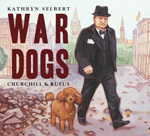 Poodles are known for their loyalty to their owners, just as Rufus was a loyal companion to Winston Churchill during World War II. In her first picture book, Kathryn Selbert depicts Churchill’s friendship with Rufus, his loyal miniature poodle, through the major events of the war. Churchill’s home was under attack, and he took shelter in a bunker while Rufus stayed by his side. When Churchill proclaimed that the war had ended and that the invasion of Normandy was a success, Rufus barked and howled. The text includes quotes from Churchill, a list of recommended resources, and an author’s note about Churchill’s pets, a short biography, and beautifully illustrated pages that bring the story to life.
Poodles are known for their loyalty to their owners, just as Rufus was a loyal companion to Winston Churchill during World War II. In her first picture book, Kathryn Selbert depicts Churchill’s friendship with Rufus, his loyal miniature poodle, through the major events of the war. Churchill’s home was under attack, and he took shelter in a bunker while Rufus stayed by his side. When Churchill proclaimed that the war had ended and that the invasion of Normandy was a success, Rufus barked and howled. The text includes quotes from Churchill, a list of recommended resources, and an author’s note about Churchill’s pets, a short biography, and beautifully illustrated pages that bring the story to life.
- Wendy A. Ellis, Harding University, Searcy, AR
Intermediate Fiction Winner:
Shurtliff, Liesl. (2013). Rump: The true story of Rumpelstiltskin. New York, NY: Knopf.
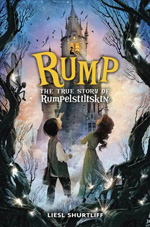 Shurtliff’s novelization of the classic fairy tale Rumpelstiltskin adds a new dimension to the traditional tale by telling the story from Rumpelstiltskin’s point of view and making him a positive character. Rump’s mother died in the process of naming him. As a result, his partial name “Rump” has made him the victim of endless teasing and bullying. Now twelve-year-old Rump is on a double quest: First, he wants to unlock his destiny by discovering his full name. And second, he wants to learn how to break a long-standing curse so that he can help those who pay a huge price when they use his “gifts” to reach their goals. Will he be successful as he defends himself against trolls, pixies, poison apples, dangerous magic, and an evil queen?
Shurtliff’s novelization of the classic fairy tale Rumpelstiltskin adds a new dimension to the traditional tale by telling the story from Rumpelstiltskin’s point of view and making him a positive character. Rump’s mother died in the process of naming him. As a result, his partial name “Rump” has made him the victim of endless teasing and bullying. Now twelve-year-old Rump is on a double quest: First, he wants to unlock his destiny by discovering his full name. And second, he wants to learn how to break a long-standing curse so that he can help those who pay a huge price when they use his “gifts” to reach their goals. Will he be successful as he defends himself against trolls, pixies, poison apples, dangerous magic, and an evil queen?
- Terrell A. Young, Brigham Young University
Intermediate Fiction Honor Books:
Blakemore, Megan Frazer. (2013). The Water Castle. New York, NY: Walker.
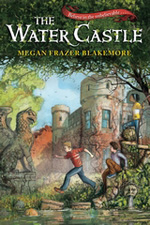 After his father suffers a stroke, Ephraim Appledore-Smith and his family move to the Water Castle, their mother’s ancestral home in Maine. According to local legend, the water in the area has special powers. Ephraim is quick to dismiss the notion until his athletic brother’s swimming abilities improve dramatically shortly after moving in to their new home. Ephraim and two unlikely friends seek to solve the mystery of the Water Castle and whether the Fountain of Youth exists on the estate. The book’s narration alternates between Ephraim, and his unlikely friends: Mallory whose family has been the caretakers of the estate for generations, and Will whose family has a long-held dispute with the Appledores. Ephraim is determined to find something either magical or scientific that can help his father regain his health.
After his father suffers a stroke, Ephraim Appledore-Smith and his family move to the Water Castle, their mother’s ancestral home in Maine. According to local legend, the water in the area has special powers. Ephraim is quick to dismiss the notion until his athletic brother’s swimming abilities improve dramatically shortly after moving in to their new home. Ephraim and two unlikely friends seek to solve the mystery of the Water Castle and whether the Fountain of Youth exists on the estate. The book’s narration alternates between Ephraim, and his unlikely friends: Mallory whose family has been the caretakers of the estate for generations, and Will whose family has a long-held dispute with the Appledores. Ephraim is determined to find something either magical or scientific that can help his father regain his health.
- Terrell A. Young, Brigham Young University
Vawter, Vince. (2013). Paperboy. New York, NY: Delacorte Press.
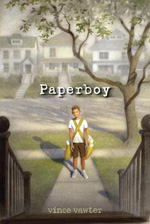 “I’m typing about the stabbing for a good reason. I can’t talk. Without the stuttering” (p. 1). From the very opening lines of Paperboy, readers are hooked by this coming-of-age story of Victor, an eleven-year-old boy growing up in Memphis in 1959. Victor is known around town for his wicked fastball and his debilitating stutter. As the narrator, Victor tells us his first-hand account of the month he takes over his best friend’s paper route. This month unexpectedly changes his life as he meets a series of people that open his eyes to real-world issues and give him the confidence to overcome his stutter. Paperboy is beautifully crafted and precisely captures the thoughts and feelings of the main character, so the reader begins to have an understanding of how stuttering affects a person’s ability to communicate. This book would make an excellent addition to any personal or classroom library.
“I’m typing about the stabbing for a good reason. I can’t talk. Without the stuttering” (p. 1). From the very opening lines of Paperboy, readers are hooked by this coming-of-age story of Victor, an eleven-year-old boy growing up in Memphis in 1959. Victor is known around town for his wicked fastball and his debilitating stutter. As the narrator, Victor tells us his first-hand account of the month he takes over his best friend’s paper route. This month unexpectedly changes his life as he meets a series of people that open his eyes to real-world issues and give him the confidence to overcome his stutter. Paperboy is beautifully crafted and precisely captures the thoughts and feelings of the main character, so the reader begins to have an understanding of how stuttering affects a person’s ability to communicate. This book would make an excellent addition to any personal or classroom library.
- Allyson Hauptman, Lipscomb University
Intermediate Nonfiction Winner:
McLachlan, Brian. (2013). Draw out the story: Ten secrets to creating your own comic. Berkeley, CA: Owlkids Books.
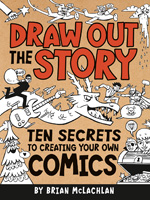 Draw Out the Story: Ten Secrets to Creating Your Own Comics is fascinating. From the Table of Contents, written as a comic, to the “Your Turn” sections, in which readers are invited to try out the ideas from the chapter, readers will be captivated by this unique how-to text. Brian McLachlan uses his considerable drawing and storytelling talents to guide readers through a step-by-step process for creating their own comics. Special consideration is given to important aspects of creating comics such as style considerations, genre, formatting ideas, the use of icons and shapes, and the fine art of creating details. The author wows his audience with a combination of visually stunning comics and traditional text. He draws and writes this book in such a way that anyone will feel confident in being able to create an engaging comic book story. This is a book that kids will love and teachers will love to use.
Draw Out the Story: Ten Secrets to Creating Your Own Comics is fascinating. From the Table of Contents, written as a comic, to the “Your Turn” sections, in which readers are invited to try out the ideas from the chapter, readers will be captivated by this unique how-to text. Brian McLachlan uses his considerable drawing and storytelling talents to guide readers through a step-by-step process for creating their own comics. Special consideration is given to important aspects of creating comics such as style considerations, genre, formatting ideas, the use of icons and shapes, and the fine art of creating details. The author wows his audience with a combination of visually stunning comics and traditional text. He draws and writes this book in such a way that anyone will feel confident in being able to create an engaging comic book story. This is a book that kids will love and teachers will love to use.
- Allyson Hauptman, Lipscomb University
Young Adult Fiction Winner:
Rowell, Rainbow. (2013). Eleanor & Park. New York, NY: Macmillan/St. Martin’s Griffin.
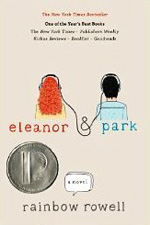 There is substance and hope in Rowell’s realistic fiction novel Eleanor & Park. Eleanor shows readers how to get out of an impossible situation by reaching out and asking for help. The book also explores issues of class, peer pressure and gender expectations. Park grapples with “pockets of shallow inside himself” (178) that cause him to betray Eleanor in order to face the peer pressure that comes from loving a misfit. Eleanor and Park both find ways to overcome the bullying and negativity that erupts from the class and gender expectations of peers and parents in response to things like “girls shouldn’t wear men’s clothes” and “boys shouldn’t wear eyeliner.” There is also joy that is so compelling readers will identify with these two sixteen-years-olds and stand at the cusp of first love with all its massive, complex tangles and shivers.
There is substance and hope in Rowell’s realistic fiction novel Eleanor & Park. Eleanor shows readers how to get out of an impossible situation by reaching out and asking for help. The book also explores issues of class, peer pressure and gender expectations. Park grapples with “pockets of shallow inside himself” (178) that cause him to betray Eleanor in order to face the peer pressure that comes from loving a misfit. Eleanor and Park both find ways to overcome the bullying and negativity that erupts from the class and gender expectations of peers and parents in response to things like “girls shouldn’t wear men’s clothes” and “boys shouldn’t wear eyeliner.” There is also joy that is so compelling readers will identify with these two sixteen-years-olds and stand at the cusp of first love with all its massive, complex tangles and shivers.
- Janice Strop, Cardinal Stritch University, Milwaukee, WI
Young Adult Fiction Honor Books:
Laban, Elizabeth. (2013). The Tragedy Paper. New York, NY: Knopf.
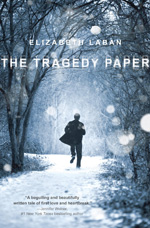 Excitement mixed with dread fills Duncan Meade as he returns to the prestigious Irving School to finish his final year of boarding school. Nervously anticipating his room assignment and the gift bequeathed him by its previous inhabitant, he tries to smother his anxiety about the unavoidable senior year assignment: the tragedy paper. A stack of CDs left by Tim Macbeth, the albino transfer student whose room Duncan inherits, provides unlikely answers to a host of Duncan’s concerns. Although disappointed with his gift, Duncan reluctantly begins listening, but quickly becomes absorbed in Tim’s narrative of his own senior year, his unlikely romance with popular Vanessa Sheller, the senior games accident, and Duncan’s involvement in the tragedy. Readers will enjoy suspenseful chapters that alternate seamlessly between Tim and Duncan’s perspectives, weaving together two teens’ stories in surprising ways that raise significant questions concerning secrets, romance, and friendship.
Excitement mixed with dread fills Duncan Meade as he returns to the prestigious Irving School to finish his final year of boarding school. Nervously anticipating his room assignment and the gift bequeathed him by its previous inhabitant, he tries to smother his anxiety about the unavoidable senior year assignment: the tragedy paper. A stack of CDs left by Tim Macbeth, the albino transfer student whose room Duncan inherits, provides unlikely answers to a host of Duncan’s concerns. Although disappointed with his gift, Duncan reluctantly begins listening, but quickly becomes absorbed in Tim’s narrative of his own senior year, his unlikely romance with popular Vanessa Sheller, the senior games accident, and Duncan’s involvement in the tragedy. Readers will enjoy suspenseful chapters that alternate seamlessly between Tim and Duncan’s perspectives, weaving together two teens’ stories in surprising ways that raise significant questions concerning secrets, romance, and friendship.
- Dawan Coombs, Brigham Young University
Williams, Katie. (2013). Absent. San Francisco, CA: Chronicle Books.
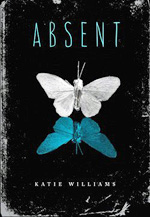 Whether one believes in ghosts or not, Absent is a touching and serious look at perceptions, friendships, and truth. Students forever bound by the walls of their school through death continue to watch their living classmates every day, discovering that things are never what they seem, even in their own minds. This book gives readers a look at many characters’ points of view with twists and turns continuously changing what appears to be the truth. Young adults who read this book will see there is no one obvious answer, no one way to grieve, and no one way to express feelings during one of the most emotional times in their lives.
Whether one believes in ghosts or not, Absent is a touching and serious look at perceptions, friendships, and truth. Students forever bound by the walls of their school through death continue to watch their living classmates every day, discovering that things are never what they seem, even in their own minds. This book gives readers a look at many characters’ points of view with twists and turns continuously changing what appears to be the truth. Young adults who read this book will see there is no one obvious answer, no one way to grieve, and no one way to express feelings during one of the most emotional times in their lives.
- Debby Addison, Schreiner University, Kerrville, TX
Weekly book reviews on Reading Today Online
are coordinated by the International Reading Association’s Children’s Literature and Special Interest Group (CL/R SIG). These reviews were submitted by members of the IRA Children's and Young Adults' Book Awards Committee.